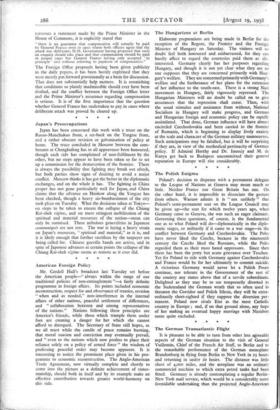Japan's Preoccupations Japan has been concerned this week with a
truce on the Russo-Manchukuo front, a set-back on the Yangtse front, and a rather obscure revision or galvanisation of policy at home. The truce concluded in Moscow between the com- batants at Changkufeng has to all appearance been honoured, though each side has complained of non-fulfilment by the other, but no steps appear to have been taken so far to set up a commission for the demarcation of the frontier. There is always the possibility that fighting may break out afresh, but both parties show signs of desiring to avoid a major conflict. Moscow thinks it has got the better in the diplomatic exchanges, and on the whole it has. The fighting in China proper has not gone particularly well for Japan, and China claims that the advance on Hankow along the Yangtse has been checked, though a heavy air-bombardment of the city took place on Tuesday. What the decisions taken at Tokyo— on steps to be taken to ensure the collapse of the Chiang Kai-shek regime, and on more stringent mobilisation of the spiritual and material resources of the nation—mean can only be surmised. These nebulous generalities in Japanese communiqués are not rare. The war is laying a heavy strain on Japan's resources, " spiritual and material,", as it is, and it is likely enough that further sacrifices by the taxpayer are being called for. Chinese guerilla bands are active, and in spite of Japanese advances at certain points the collapse of the Chiang Kai-shek regime seems as remote as it ever did.
* * * *






































 Previous page
Previous page